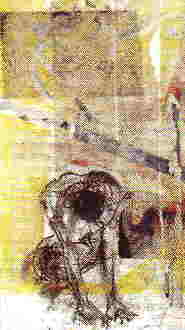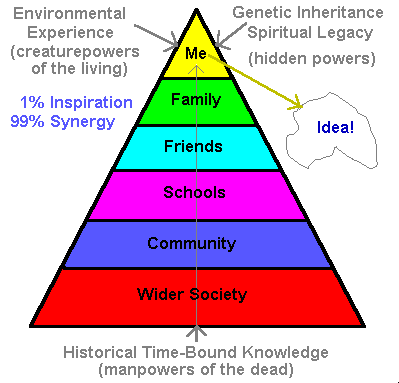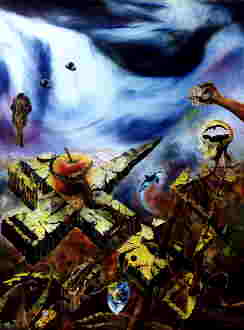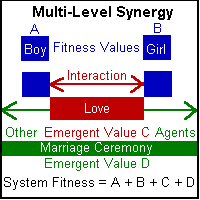"Our remedies oft in ourselves do lie,
Which we ascribe to heaven."William Shakespeare (1564-1616), Helena, All's Well That Ends Well
"Imagination is the eye of the soul."
Joseph Joubert (1754-1824)
I have a dream, and that dream involves you.
You are central to my dream, for within you I see myself and within myself I see you.
Thus if I hurt you I hurt myself, and if I hurt myself I hurt you.
Are you a human then ? Or are you a tree ? Maybe a giant panda ?
A mountain or a sea ? A work of art ?
No, you are all of these and more,
You are my reality, vibrant, living, creative, ageless, and I love you dearly.
But you are ill and I grieve,
You are dying and I mourn,
You have caught a fatal disease and it calls itself hate,
You are infested by parasites and they call themselves greed,
Your beauty is defaced and it calls itself lies,
They whip you into a corner and call themselves rulers,
Oh, what shall I do my friend ?
For you are my Earth, and if you perish then so do I...
But now I understand, what you have been telling me these aeons,
The truth residing so clear in the Tao, in Buddha, in Christ...
The world is one, there are no divisions,
The world is spirit, there is no matter,
Only flow, only energy, only becoming.
From the void complexity arises,
From complexity new life emerges,
From life I am reborn, fluttering into the light,
Grasping the essence of the universal soul.
And having grasped, I will not let go, nor forsake thy quest,
I will not fail you my fair planet, nor abandon you to chaos.
But will apply my wisdom, my understanding, now to educate,
To raise awareness of your essence, to stop the rot.
In the cosmos I will put my trust, for universal processes surely hold the key,
To dynamics and evolution, to creativity and to balance. To health.
"When we look into the heart of a flower, we see clouds, sunshine, minerals, time, the earth, and everything else in the cosmos in it. Without clouds, there could be no rain, and there would be no flower. Without time the flower could not bloom. In fact the flower is made entirely of non-flower elements; it has no independent, individual existence."
Thich Nhat Hanh, Living Buddha, Living Christ, 1995, Ch.1: Be Still and Know

"Just as we need counselors to help people with the simpler problems of unmet needs, so we may need meta-counselors to help with the soul-sicknesses that grow from the unfulfilled metaneeds... Looking within oneself for many of the answers implies taking responsibility. That in itself is a great step towards actualization... We need a different kind of human being to be able to live in a world that changes perpetually, that doesn't stand still... The more he knows about his own nature, his deep wishes, his temperament, his constitution, what he seeks and yearns for and what really satisfies him, the more effortless, automatic and epiphenomenal become his value choices."
Abraham Maslow, The Farther Reaches of Human Nature, 1971, Ch. 3/4/8
Loving ourselves is easy, loving our enemies is hard. But what if we are our own worst enemy, if we suffer from that soul-sickness ? If the world reflects our behaviours, our choices, then the enemies we see are truly images of our deep selves. Our attitudes create our world, "as we sow so shall we reap". Complex systems, as universal processes, consist of complex causalities, which are circular causalities. What we do returns to ourselves, our effects on all others define their effects upon us by feedback processes. Our limitations will limit our world, it cannot be more than we think possible, so your limitations socially limit my perceived freedom and vice-versa. Understanding that we co-construct our world, that our world reflects what we both are, what we collectively choose to believe, allows us to turn our gaze inward. If we want a better world, then we need a better us, a more understanding us, a more imaginative us. We must develop ourselves, gaining awareness of our inbuilt limitations and prejudices and learn how to best transcend them. A new mode of thought, a new mode of science is needed. Complexity science reconnects us to our world,
dissolving the subjective/objective delusion, that separating barrier that was never actually there. It reconnects us to ourselves, it allows us to reverse our descent into despair.
"A functional analysis, free from the old mythological and zoological assumptions, showed that humans, with the most highly developed nervous system, are uniquely characterized by the capacity of an individual or a generation to begin where the former left off. I called this essential capacity ‘time-binding’... On this inherently human level of interdependence time-binding leads inevitably to feelings of responsibility, duty toward others and the future, and therefore to some type of ethics, morals, and similar social and/or socio-cultural reactions."
Alfred Korzybski, What I Believe, 1948
 In today's individualistic world (at least in the West) it is often imagined that any new ideas we create are ours, that we 'own' them and thus have full 'rights' to profit from them (whether in terms of fame, money, power or other 'rewards'). Yet this delusion was debunked in 1920 in a book by Korzybski. We owe all our abilities to our upbringing, and this upbringing is social. Our language is social, our knowledge is social, our ideas are social. As we see in academia, every new idea has a very strong grounding in the (usually cited) ideas of our past, of our predecessors, what Korzybski termed our 'time-binding' nature. Thus when we have a new idea it is no more than the top of a pyramid of support ideas, all given free, all available to every human (in principle). To claim that we deserve 100% of the credit, all the 'profit', as if we 'own' that entire pyramid, is to rob society of their share, of their support, of their synergy which enabled us to build on our past in the first place. And that share is often well over 99% ! Think of all the books you have read, the articles you have seen, the programs you have watched, the conversations you have had, your education in all its forms. All these social experiences support and maintain your humanity, remove them and you are nothing.
In today's individualistic world (at least in the West) it is often imagined that any new ideas we create are ours, that we 'own' them and thus have full 'rights' to profit from them (whether in terms of fame, money, power or other 'rewards'). Yet this delusion was debunked in 1920 in a book by Korzybski. We owe all our abilities to our upbringing, and this upbringing is social. Our language is social, our knowledge is social, our ideas are social. As we see in academia, every new idea has a very strong grounding in the (usually cited) ideas of our past, of our predecessors, what Korzybski termed our 'time-binding' nature. Thus when we have a new idea it is no more than the top of a pyramid of support ideas, all given free, all available to every human (in principle). To claim that we deserve 100% of the credit, all the 'profit', as if we 'own' that entire pyramid, is to rob society of their share, of their support, of their synergy which enabled us to build on our past in the first place. And that share is often well over 99% ! Think of all the books you have read, the articles you have seen, the programs you have watched, the conversations you have had, your education in all its forms. All these social experiences support and maintain your humanity, remove them and you are nothing.
"So now we may ask, if my body, emotions, thoughts and personality are not original or created by me, who am I really ? According to many of the great spiritual traditions, one of the great truths is that 'I am the Other'. Without the other, we would not exist. Your soul is the reflection of all souls. Imagine trying to understand the complex web of personal interactions that have made you who you are today - all your familiy and friends, every teacher and classmate you've ever had, every shop clerk in every store you've ever visited, everyone you've ever worked with or come into contact with at any point in your life. And then, in order to understand all those people and the types of influence they may have had, on you, you have to find out who they are... Eventually, you would find that you would need to describe the whole universe in order to define a single person. In truth then, every single person is the whole universe. You are the infinite, seen from a specific localized point of view."
Deepak Chopra, SynchroDestiny, 2003, Ch. 3
Understanding our dependence upon others, in all these ways, brings home to us the nature of the error of thinking that individuality means we don't depend upon others, and that everything that we can use is 'ours', responsibility free - it is not. We cannot have individuality without others, for if we tried we would descend back to animals, all struggling to survive and to meet our primal needs. Being human, having any society at all, requires us to connect synergistically. Thus 'copyrights' and 'patents' as currently applied are largely thefts of society's heritage, stealing what was freely given and selfishly trying to sell it back to the original owners, i.e. the people - an irresponsibly anti-social or even criminal act !

"My analysis showed that happenings in the world outside our skins...occur only on the non-verbal, or what I call silent levels. Our speaking occurs on the verbal levels, and we can speak about, but not on, the silent or un-speakable levels... Whatever we may say something is, obviously is not the ‘something’ on the silent levels... I firmly believe that the consciousness of the differences between these levels of abstractions; i.e., the silent and the verbal levels, is the key and perhaps the first step for the solution of human problems. If we ‘think’ verbally, we act as biased observers and project onto the silent levels the structure of the language we use, and so remain in our rut of old orientations, making keen, unbiased, observations and creative work well-nigh impossible. In contrast, when we ‘think’ without words, or in pictures (which involve structure and therefore relations), we may discover new aspects and relations on silent levels, and so may produce important theoretical results in the general search for a similarity of structure between the two levels, silent and verbal. Practically all important advances are made that way."
Alfred Korzybski, What I Believe, 1948
When we look out of the window we see a 'territory', we experience the world directly. This is not the actual world of course, but the world filtered through our limited faculties and senses. These can be expanded via technology, e.g. infra-red cameras, (and other creatures have alternative sensual abilities) but in no sense can we experience all of reality. Yet when we use words to describe this 'reality' we abstract (reduce) it even further. From our experience of an entire landscape we describe only a small portion of it (e.g. a 'tree'), our 'map' is a formalised subset of even our very limited experience. Much science and life makes the major error of assuming then that this 'map' is a full model of the 'territory', sometimes leading to categorical denials that any other aspects of reality (including 'humans' !) actually exist - which we can see is really quite absurd. No 'map', however clever the 'designer', encompasses all aspects of the world depicted, no 'theory' is ever 'complete'. Overcoming this major defect in our thinking, which leads to all sorts of prejudicial and destructive 'one-dimensional' behaviours, is a major benefit of the 'whole systems' approach taken by complexity science.
"Art is the imposing of a pattern on experience, and our aesthetic enjoyment in recognition of the pattern."
Alfred North Whitehead (1861-1947)
"Art is a human activity having for its purpose the transmission to others of the highest and best feelings to which men have risen"
Leo Nikolaevich Tolstoi, What Is Art ? 1898, Ch.8

"Art does not reproduce the visible; rather, it makes visible."
Paul Klee (1879-1940)
"It is the Noble Eightfold Path, the way that leads to the extinction of suffering, namely:
1. Right View, 2. Right Thought, which together are
Wisdom.
This is the Middle Path which the Perfect One has found out, which
makes one both to see and to know, which leads to peace, to discernment, to enlightenment, to Nirvana."
3. Right Speech, 4. Right Action, 5. Right Livelihood, which together
are Morality.
6. Right Effort, 7. Right Attentiveness, 8. Right Concentration,
which together are Meditation.
The Word of the Buddha, 500 BCE
In complexity thought, which also treats the errors in our thinking, a similar understanding has taken place to the Buddha's, so that we can apply our science to these ancient ideas and see if they are meaningful in a modern context.
We should not make too much of these eight categories however, both complexity science and Buddhism adopt many different classification schemes in different contexts, and we should also realise that there is not a linear progression implied here, but a non-linear spiral - a continuous improvement in approach and expertise. Yet it remains true that complexity science formalises and extends science in a way compatible with ancient wisdom traditions (from all sources), and in this way makes more rigorous and applicable the insights that such experience contains.
"From all comparative material, the conclusion that emerges is that societies where non-aggression is conspicuous have social orders in which the individual by the same act and at the same time serves his own advantage and that of the group... Non-aggression occurs (in these societies) not because people are unselfish and put social obligations above personal desires, but when social arrangements make these two identical.
I speak of cultures with low-synergy where the social structure provides for acts which are mutually opposed and counteractive, and cultures with high-synergy where it provides for acts that are mutually reinforcing... I spoke of societies with high social synergy where their institutions insure mutual advantage from their undertakings, and societies of low social synergy where the advantage of one individual becomes a victory over another, and the majority who are not victorious must shift as they can."
Ruth Benedict, Lectures at Bryn Mawr College, 1941
Science in the past has been very good at breaking down our world into parts, at analysis. And the rest of our institutions have gladly followed suit. We have arrived at a worldview emphasising separateness, individuality, competition, disjointedness and independence. Yet all of these are myths. Putting the parts back together is never done, yet this synthesis is very necessary if we are to have a real world, not a fantasy one. In nature there are no divisions, life is a synthesis of connected parts and the dynamics are complex. From this natural structural complexity new properties arise, new higher levels emerge (e.g. organisms from cells). Whether the new properties are good or bad for the parts is Benedict's focus.
 Her 'low synergy' corresponds to what we would call 'dysergy' - the parts are harmed overall due to the interaction structures, and this mode is endemic to today's global social scene. The alternative 'high synergy', which we'll just call 'synergy', benefits the parts overall every time individual ones benefit, and this is the mode we see in the natural world in areas such as symbiosis, ecological recycling and mutual aid. Bringing this mode into our own societies is fairly easy in principle, whilst being diametrically opposed to much social thinking in the reductionist style - which escalates dysergy and ignores synergy.
Her 'low synergy' corresponds to what we would call 'dysergy' - the parts are harmed overall due to the interaction structures, and this mode is endemic to today's global social scene. The alternative 'high synergy', which we'll just call 'synergy', benefits the parts overall every time individual ones benefit, and this is the mode we see in the natural world in areas such as symbiosis, ecological recycling and mutual aid. Bringing this mode into our own societies is fairly easy in principle, whilst being diametrically opposed to much social thinking in the reductionist style - which escalates dysergy and ignores synergy.
The key to doing this is the simple recognition that when two or more people come together then their working together adds value, whilst opposing each other takes it away - since both are part of the same 'whole' which determines that overall value ! Thus my 1 and your 1 make 2; if we ignore each other this is what remains; if you suppress me only your 1 remains; if we both suppress each other then 0 remains. If we share our assets then each of our 'quality of lives' increases, we get 3 or 4 in total. But synergic imagination means we can do better with these double assets, allowing 5 or more to become obtainable. The blatant mathematical obviousness of all this is in sharp contrast with actual human behaviours. Sadly in our social world the institutional incentives are often designed to reward the opposite behaviour, to encourage selfishness, to encourage destruction, to help bully and demonize other people. Reversing that trend is easy, given the political will, but that is the crunch. People hold onto power despite the fact that distributed power is more effective (allowing self-organizing efficiencies). Giving power away is more powerful than keeping it ! This is true since this then allows the fusion of opposites, the ebb and flow of power around the whole system, in such a way as to make best use dynamically of the diverse expertise of all the participants. Such dynamics are strongly supported by the complexity viewpoint, which suggests that well implemented 'downward causation' (the whole constraining and enabling the parts appropriately) is the key to obtaining high social synergy - that 'social capital' now being recognised as of vital importance by many in 'Global Civil Society', and going far beyond those simplistic and destructive views based upon economic delusions so central to today's institutions and their resulting monocultures of conformity.
"Too much happiness, too much unhappiness, out of due time, men are thrown off balance. What will they do next ? Thought runs wild. No control. They start everything, finish nothing. Here competition begins, here the idea of excellence is born, and robbers appear in the world... Now the whole world is not enough reward for the 'good', nor enough punishment for the 'wicked'... From the time of the Three Dynasties men have been running in all directions. How can they find time to be human ?
The wise man, then, when he must govern, knows how to do nothing. Letting things alone he rests in his original nature. He who will govern respects the governed no more than he respects himself. If he loves his own person enough to let it rest in its original truth, he will govern others without hurting them... In complete silence his voice will be like thunder. His movements will be invisible, like those of a spirit, but the powers of heaven will go with them. Unconcerned, doing nothing, he will see all things grow ripe around him. When will he find time to govern ?"
The Way of Chuang Tzu, c.250 BCE, ai, 1-2
"Teach the children what we have taught our children:
That the Earth is our Mother.
Whatever befalls the Earth befalls the sons and daughters of the Earth.
If men spit upon the ground they spit upon themselves. This we know.
The Earth does not belong to us, we belong to the Earth. This we know.
All things are connected, like the blood which unites one family, all things are connected.
Whatever befalls the Earth befalls the sons and daughters of the Earth.
We did not weave the web of life, we are merely a strand in it.
Whatever we do to the web we do to ourselves."Chief Seattle, North American Suqwamish/Duwamish People
 Based upon the insights of both the complex system sciences and the ancient wisdom traditions we can see that almost all behaviours in today's world are self-destructive. Instead of joining up our world, of enhancing our quality of life, they act to divide, distort, domineer, degenerate and ultimately destroy our entire reality These errors are based upon mental delusions, forms of belief that are invalid and are being held dogmatically without genuine scientific justification. They are based upon dualist thinking - the idea that parts are independent; that there are only ever two answers - right and wrong; that isolated theories apply to non-isolated wholes; that there are single causes linked to single events; that causality acts linearly and that people are mere deterministic machines (with a spirituality which, if it exists at all, is entirely divorced from the material world). All these ideas are untenable in a modern philosophical view - but we still teach them in all our schools !
Based upon the insights of both the complex system sciences and the ancient wisdom traditions we can see that almost all behaviours in today's world are self-destructive. Instead of joining up our world, of enhancing our quality of life, they act to divide, distort, domineer, degenerate and ultimately destroy our entire reality These errors are based upon mental delusions, forms of belief that are invalid and are being held dogmatically without genuine scientific justification. They are based upon dualist thinking - the idea that parts are independent; that there are only ever two answers - right and wrong; that isolated theories apply to non-isolated wholes; that there are single causes linked to single events; that causality acts linearly and that people are mere deterministic machines (with a spirituality which, if it exists at all, is entirely divorced from the material world). All these ideas are untenable in a modern philosophical view - but we still teach them in all our schools !
"Man is coming to realise that if he is going to survive he must learn from the Indian. He must learn to take better care of the land, reverse his greedy practices and learn responsibility to the Earth Mother. He must learn to share with the winged ones, the four legged and the fish as well. There is beauty and value in a desolate space left just as it is. Let his greed and arrogance disappear and let him say the Earth is our Mother. Then man will come alive, again."
Sun Bear, North American Chippewa People
To reverse all these ingrained blinkered views is obviously a major task, but we now have the tools to approach this, and from a scientific perspective that is more in tune with the systems of thought that originally generated such part views - and which then invalidly extrapolated them to be all of 'reality'. Putting part views in their proper place allows us to observe the real effects of our actions upon the whole and prevents manipulators being (conveniently) allowed to push the negativities and their failures 'under the carpet' where they can avoid critical scrutiny. To do this successfully we need openness and honesty and we must counter the arrogance and dishonesty behind so much of today's obsessive greed culture (an 'addiction' that is just as pernicious, if not more so, than any based upon hard drugs or similar self-destructive behaviours). Better education is a strong enabling factor for achieving this - seeing clearly, in good light, exposes our seriously outdated mindsets to perceptive critical thinking.